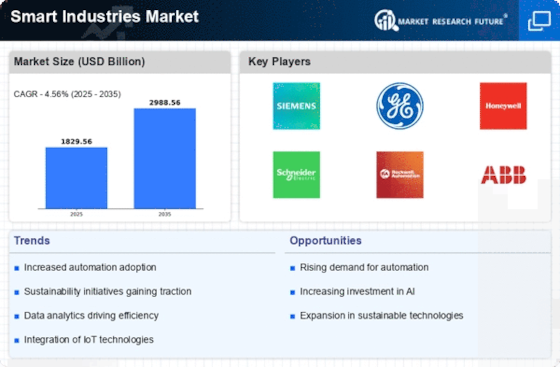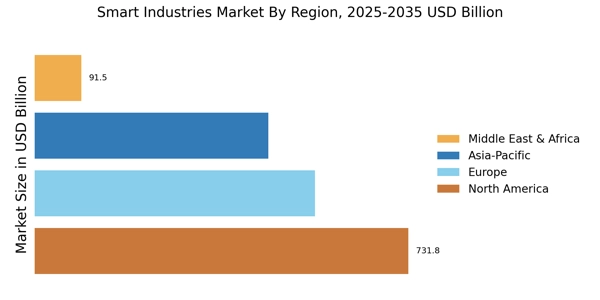Focus on Cybersecurity Solutions
As the Smart Industries Market becomes increasingly interconnected, the importance of cybersecurity cannot be overstated. The rise in cyber threats poses significant risks to operational integrity and data security. Organizations are investing heavily in cybersecurity solutions to protect their assets and maintain trust with stakeholders. Recent reports suggest that the cybersecurity market within the Smart Industries Market is expected to grow by 12% over the next few years. This growth reflects the urgent need for robust security measures as industries adopt more connected devices and systems. By prioritizing cybersecurity, companies can safeguard their operations against potential breaches, thereby ensuring the resilience and reliability of their services in the Smart Industries Market.
Rising Demand for Data Analytics
Data analytics is becoming a cornerstone of the Smart Industries Market, as organizations seek to leverage data for informed decision-making. The ability to analyze vast amounts of data in real-time allows companies to optimize operations, predict maintenance needs, and enhance customer experiences. Recent statistics indicate that the data analytics segment within the Smart Industries Market is anticipated to grow by 15% annually. This growth is fueled by the increasing availability of data and advancements in analytical tools. Companies that harness data analytics can gain a competitive edge, as they can identify trends and make proactive adjustments to their strategies. Consequently, the Smart Industries Market is evolving into a data-driven landscape, where insights derived from analytics play a pivotal role in shaping business outcomes.
Integration of Artificial Intelligence
The integration of artificial intelligence (AI) is reshaping the Smart Industries Market, offering unprecedented opportunities for innovation and efficiency. AI technologies enable predictive maintenance, quality control, and supply chain optimization, which are essential for modern manufacturing. Current estimates indicate that the AI segment within the Smart Industries Market is projected to expand at a rate of 20% annually. This rapid growth is attributed to the increasing adoption of machine learning algorithms and intelligent systems that enhance operational capabilities. As industries embrace AI, they are likely to experience improved productivity and reduced costs, positioning themselves competitively in the Smart Industries Market. The potential for AI to drive transformative changes is vast, suggesting a future where intelligent systems play a central role in industrial operations.
Advancements in Automation Technologies
The Smart Industries Market is experiencing a notable surge in automation technologies, which are revolutionizing manufacturing processes. Automation enhances efficiency, reduces operational costs, and minimizes human error. According to recent data, the automation segment is projected to grow at a compound annual growth rate of 10% over the next five years. This growth is driven by the increasing demand for precision and speed in production lines. As industries adopt advanced robotics and artificial intelligence, the Smart Industries Market is likely to witness a transformation in how products are designed, manufactured, and delivered. Furthermore, the integration of automation technologies is expected to lead to improved safety standards and reduced downtime, thereby enhancing overall productivity.
Sustainability Initiatives and Regulations
Sustainability is becoming a critical focus within the Smart Industries Market, driven by both consumer demand and regulatory pressures. Companies are increasingly adopting sustainable practices to reduce their environmental footprint and comply with stringent regulations. Recent data indicates that the sustainability segment in the Smart Industries Market is expected to grow by 8% annually. This growth is influenced by the rising awareness of climate change and the need for responsible resource management. Organizations that prioritize sustainability not only enhance their brand reputation but also achieve cost savings through energy efficiency and waste reduction. As sustainability initiatives gain traction, the Smart Industries Market is likely to witness a shift towards greener technologies and practices, fostering a more sustainable industrial landscape.
















